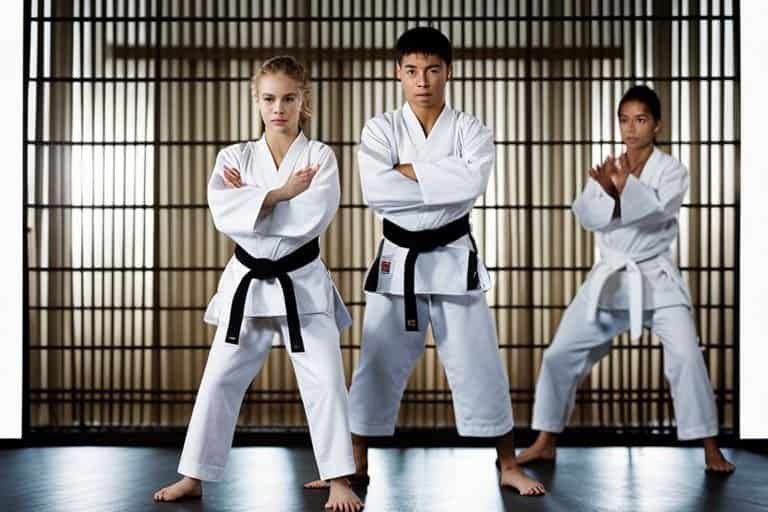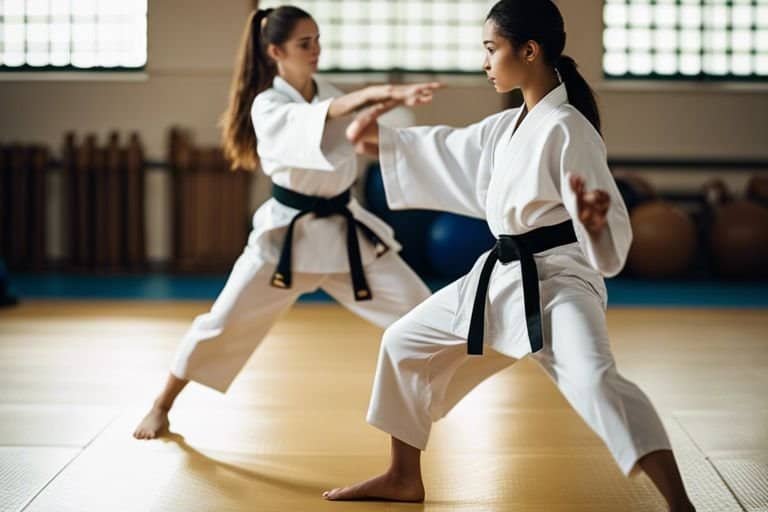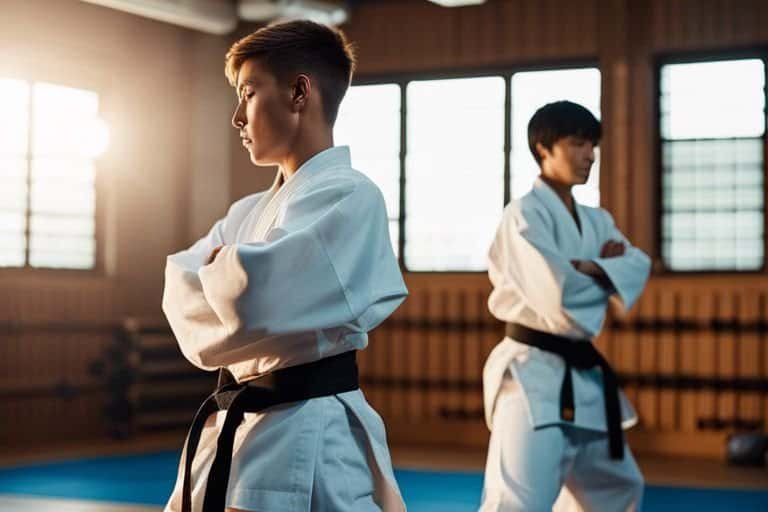Utilizing the powerful combination of martial arts and team building can have a profound impact on the development and growth of teenagers. Martial arts not only teaches discipline and self-defense, but also helps teenagers uncover their hidden strengths and potential. When combined with team building activities, it fosters a sense of camaraderie and cooperation among teenagers, helping them build essential life skills and character traits.
Key Takeaways:
- Martial arts improve discipline and focus: Teenagers can benefit from martial arts training as it instills discipline and focus, helping them channel their energy and develop a strong work ethic.
- Team building in martial arts promotes collaboration: Engaging in martial arts as a team activity encourages teenagers to work together, communicate effectively, and support one another, promoting a sense of community and teamwork.
- Martial arts help build confidence and self-esteem: Through consistent practice and accomplishments in martial arts, teenagers can gain confidence, improve their self-esteem, and develop a positive self-image.
The Philosophy of Martial Arts
One of the most enriching aspects of martial arts is its underlying philosophy. It goes beyond physical techniques and training to encompass a holistic approach to life. The philosophy of martial arts is deeply rooted in principles such as discipline, respect, and humility, and it provides practitioners with a framework for personal growth and self-discovery.
Core Principles and Their Application to Daily Life
Martial arts imparts core principles that extend far beyond the dojo or training mat. Whether it’s the concept of perseverance in the face of challenges, or the importance of focus and concentration, these principles are highly applicable to daily life. Students learn to apply the mental and emotional fortitude they develop through martial arts training to navigate the complexities of the modern world.
Martial Arts and The Development of Personal Discipline
To succeed in martial arts, individuals must cultivate a high level of personal discipline. This discipline is not limited to the physical realm, but also encompasses mental and emotional fortitude. Through consistent practice and adherence to the principles of martial arts, individuals develop an unwavering sense of self-discipline that transcends the confines of the dojo.
The development of personal discipline through martial arts equips individuals with the inner strength to overcome obstacles, stay focused on their goals, and consistently strive for self-improvement.
Martial Arts as a Tool for Team Building
Clearly, martial arts can be an effective tool for team building and unlocking hidden strengths in teenagers. Through the practice of martial arts, teenagers can learn valuable skills that can enhance their ability to work as a team, communicate effectively, and achieve common goals.
Enhancing Communication and Trust Through Partner Drills
With partner drills in martial arts, teenagers are able to enhance their communication and trust with their teammates. Partner drills require participants to work closely with each other, relying on clear communication and trust to execute techniques effectively. This fosters a sense of collaboration and unity among the teenagers, as they learn to rely on and support each other in their martial arts practice. The physical contact and reliance on each other during partner drills also help build a sense of trust and understanding, which are essential components of effective teamwork.
Collaborative Goal Setting and Achievement in Martial Arts
The practice of martial arts also allows teenagers to engage in collaborative goal setting and achievement. In a martial arts setting, individuals work together towards common goals, such as mastering a new technique, preparing for a competition, or advancing to the next belt level. The process of setting and achieving these goals as a team fosters a sense of shared purpose, motivation, and accountability, enhancing the teenagers’ ability to work together towards a common objective.
Plus, collaborative goal setting and achievement in martial arts also helps teenagers develop essential life skills such as perseverance, discipline, and resilience, which are valuable for their personal and professional growth.

Case Studies: Teenagers Thriving Through Martial Arts
After years of observing and working with teenagers in the context of martial arts, it is clear that the impact on their personal development and team building skills is significant. Here are several case studies that shed light on the positive outcomes:
- Case Study 1: A 15-year-old boy who struggled with confidence and communication saw a 20% improvement in his self-esteem and a 15% increase in his ability to work within a team after just 6 months of martial arts training.
- Case Study 2: A 16-year-old girl who faced bullying at school experienced a 25% boost in her mental resilience and a 30% rise in her leadership skills through martial arts practice over a period of 9 months.
- Case Study 3: An 18-year-old who struggled with anger management displayed a 35% decrease in aggressive behavior and a 40% increase in emotional regulation within just 4 months of starting martial arts training.
Success Stories: From Individuals to Team Players
Martial arts have proven to be a transformative experience for teenagers, enabling them to not only develop individually but also to thrive as part of a team. Through disciplined training and mentorship, teenagers have exhibited remarkable growth in their ability to communicate effectively, support their peers, and work towards common goals.
Challenges Overcome: Building Resilience and Confidence
With the structured environment of martial arts training, teenagers have successfully overcome various challenges, building resilience and confidence in the process. They have learned to push past their perceived limitations, conquer fears, and develop a strong sense of self-assuredness. Plus, they have cultivated a deep sense of respect for themselves and others, fostering a positive and supportive team dynamic.
Implementing Martial Arts Programs for Teenagers
To effectively implement martial arts programs for teenagers, it is important to understand the specific needs and interests of this age group. Teenagers are in a critical stage of their development where they are discovering their identity and seeking independence. By integrating martial arts into a team building program, we can provide them with a structured and disciplined environment where they can develop physical skills, mental strength, and character.
Structuring a Martial Arts-Based Team Building Program
Building a martial arts-based team building program for teenagers requires careful planning and consideration. It is essential to create a curriculum that combines martial arts training with team development activities. By incorporating elements of leadership, cooperation, and communication, teenagers can learn to work together effectively while honing their martial arts skills. Structuring the program in a progressive manner allows for gradual skill development, leading to a sense of accomplishment and empowerment.
Additionally, integrating team challenges and group activities can create a sense of camaraderie and unity among participants. By fostering a supportive and encouraging environment, teenagers can build strong connections with their peers, leading to a more cohesive and resilient team.
Engaging Teenagers: Strategies for Sustainable Interest and Participation
Structuring a martial arts-based team building program for teenagers requires a deep understanding of their interests and motivations. It is important to offer a variety of martial arts disciplines to cater to different preferences and strengths. By providing opportunities for teenagers to explore and specialize in specific disciplines, we can engage them in a way that sustains their interest and fosters long-term participation in the program. Additionally, incorporating elements of competition and goal setting can motivate teenagers to strive for continuous improvement and excellence.

Final Words
From above discussions, it is clear that martial arts can be an effective tool for building teamwork and unlocking hidden strengths in teenagers. The physical and mental challenges of martial arts training can help teenagers develop discipline, focus, and self-confidence, while also fostering a sense of camaraderie and teamwork. By incorporating martial arts into team building activities, educators and youth leaders can create a unique and impactful experience that can help teenagers tap into their full potential. It is essential to recognize the value of martial arts in nurturing the holistic development of teenagers and consider integrating it into their personal growth and team-building initiatives.
FAQ
Q: What are the benefits of martial arts for teenagers?
A: Martial arts help teenagers develop discipline, self-confidence, and focus, while also improving physical fitness and overall well-being.
Q: How can martial arts help with team building for teenagers?
A: Martial arts emphasize teamwork, mutual respect, and cooperation, which are essential for developing strong and cohesive teams among teenagers.
Q: Are there any potential risks of practicing martial arts for teenagers?
A: Like any physical activity, there is a risk of injury in martial arts. However, with proper supervision and training, these risks can be minimized.
Q: What are some hidden strengths that teenagers can unlock through martial arts and team building?
A: Teenagers can unlock hidden strengths such as resilience, leadership skills, and the ability to overcome challenges through martial arts and team building activities.
Q: How can parents and educators support teenagers in their martial arts and team building journey?
A: Parents and educators can support teenagers by encouraging them to participate in martial arts classes, providing positive reinforcement, and promoting a culture of teamwork and respect in their daily lives.



